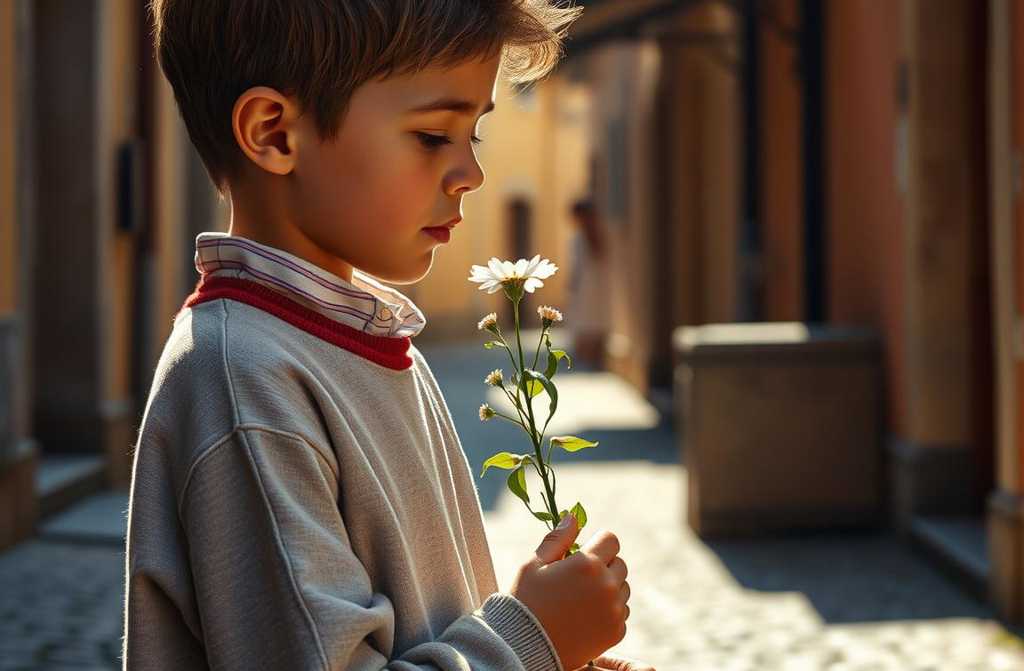З життя
Every afternoon after leaving high school, Thomas strolled down the cobbled streets with his backpack slung over one shoulder and a wildflower carefully cradled between his fingers.

Every afternoon, as he left the grammar school, Thomas walked along the cobbled streets with his satchel slung over one shoulder and a wildflower carefully cradled between his fingers.
The lanes of St. Michael’s always carried the scent of warm bread and damp earth after the rain. It was a small village, where everyone knew one another, and secrets spread faster than the wind. Among those streets walked a boy of just twelve, thin and thoughtful, with a quiet step beyond his years. His name was Thomas Whitmore, and his path never wavered.
His destination was always the same: Autumn Light Hospice, an old cream-coloured building with tall windows and a garden full of climbing roses. Not a day passed when he didnt step through its rusted gate after school.
He moved slowly inside, greeting everyoneMrs. Ethel, knitting on the bench by the door; Mr. Albert, always asking for a sweet; and the staff, who watched him with fondness. They knew Thomas didnt come out of duty, but for a reason few understood.
Up the stairs he went, down the hall to room 214. There waited Mrs. Clara Fairchild, an elderly woman with hair as white as salt and eyes that sometimes wandered, sometimes sharpened with life.
“Good afternoon, Mrs. Clara,” hed say, setting his satchel aside. “Brought your favourite flower.”
“And who might you be, dear?” shed often ask, her smile soft.
“Just a friend,” hed reply.
Mrs. Clara had once been a teacher of literature, a woman of grace and wit. But time had stolen pieces of her memory, one by one. For her, days blurred together, faces became strangers. Yet when Thomas sat with her, a spark would flicker in her gaze.
For months, he read her poems by Wordsworth and stories by Dickens. Sometimes he painted her nails a pale peach, other times he carefully braided her hair, as if she were his own grandmother. She laughed at his tales, wept quietly when words touched her heart, or mistook him for a beau from her youth.
The nurses said Thomas had an old soul in a young body. He didnt come for charity or school credithe came because he chose to.
“That boy… has a heart of gold,” Nurse Margaret, the longest-serving there, would say.
The secret no one knew
In all the time he visited, Thomas never told them he wasnt merely a “friend” to Mrs. Clara. He was her grandson. Her only one.
The truth was sorrowful: when Clara first began to forget, her only sonThomass fatherhad her moved to the hospice. At first, he visited often, but then the visits grew fewer… until one day, they stopped altogether. He said seeing her like that pained him too much. Thomas, though, couldnt bear the thought of leaving her alone.
At home, his father avoided speaking of her. “She isnt the same woman,” hed say coldly. “Best she stays there.”
But to Thomas, she would always be his grandmother. Even if she forgot his name, even if she called him “William” or “Henry,” he knew that somewhere in her mind, love still remained.
The confession
One winters day, as he combed her hair by the window, Clara fixed her gaze on him. For a moment, her eyes seemed to clear.
“You have your fathers eyes,” she murmured.
Thomas smiled.
“Perhaps fate lent them to me.”
She leaned closer, as if sharing a secret.
“My son left when I began to forget… said I wasnt his mother anymore.”
The words stung, but Thomas didnt correct her. He squeezed her hand gently.
“Sometimes, when memory fades, people do too. But not everyone forgets.”
She looked at him as if those words brought her peace, then drifted back into her thoughts.
The last summer
That year, Clara grew weaker. Her good days grew rare, and soon she could scarcely rise from bed. Thomas still came, if only to read while she slept or leave fresh flowers on her table.
One evening, the hospice doctor took him aside.
“Son, your grandmother hasnt much time left. She may not see the winter.”
Thomas bowed his head but didnt weep. He had known this would come.
On her last birthday, he arrived with a whole bouquet of wildflowers. The room smelled of the countryside. She looked at him and, with a clarity unseen for months, whispered:
“Thank you for remembering me.”
It was the last proper conversation they ever had.
The farewell
Clara passed quietly at dawn. On her nightstand lay a single wildflower, wilted yet whole, as if it had clung to life until she was gone.
The funeral was small. Few attendedsome old colleagues, the hospice staff… and Thomas. His father arrived late, stern-faced, dry-eyed.
Nurse Margaret, moved by sorrow, approached Thomas.
“Why did you never stop coming, lad?”
Thomas, his eyes red, replied:
“Because she was my grandmother. Everyone left when she fell ill. I wouldnt. Even if she didnt know me anymore.”
His father, overhearing, hung his head in shame. He said nothing, but as the service ended, he placed a hand on Thomass shoulder.
“You did what I couldnt,” he murmured. “Thank you.”
Epilogue
Years passed. Thomas grew, finished university, and became a writer. His first book was titled *The Flower That Never Faded*, dedicated to Mrs. Claras memory.
Inside, he wrote:
*”To my grandmother, who taught me that family isnt bound by memory… but by the heart.”*
On the cover was an illustration of a wildflower, just like the ones he had carried to room 214.
And so, though time stole names and dates, it couldnt steal what mattered mostthe love that remains when all else is gone.

















